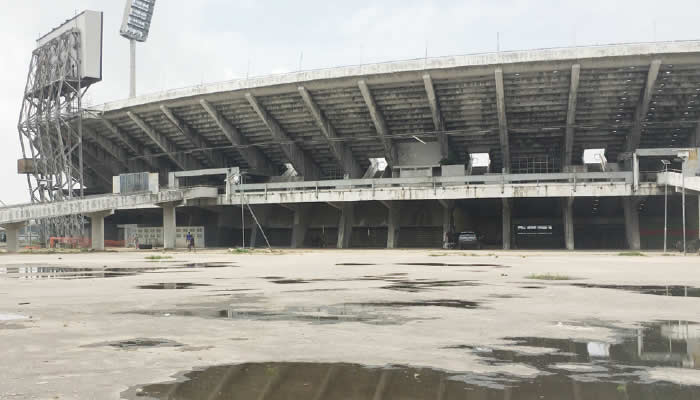A recent visit to the once elegant structure, National Stadium, Surulere, Lagos, erected for sports development and promotion, calls to question the nation’s attitude to maintenance culture. The edifice that gave a name to the entire vicinity where it is located, is, today, a shadow of its glorious past.
For the younger generation who were not around when the structure was built 50 years ago, it was the pride of the nation and the best in Africa. Built, specifically, in 1972, the then 55,000-capacity multi-purpose stadium had an Olympic-size swimming pool and a multi-purpose arena for athletics, rugby, basketball, volleyball, table tennis, wrestling and boxing. It hosted the African Games in 1973 and other major sporting events like the 1980 and 2000 Africa Cup of Nations championships, the 1999 U-20 World Cup, and top continental competitions, amongst others. The main bowl which was reduced to 45,000 sitting- capacity in 1999, hosted its last major event — the 2000 AFCON — which Nigeria co-hosted with Ghana.
Since then, the once magnificent edifice has been left to rot away by successive administrations. Following the opening of the 60,000-capacity Moshood Abiola National Stadium, Abuja, by the Olusegun Obasanjo administration in 2003, all attention, including that of the government, shifted to Abuja. While the Abuja stadium hosted the 2003 African Games, the Lagos stadium was relegated to the background. According to reports, most of the facilities in the Lagos stadium are in decay. The roof of the covered stands is torn off, the seats broken, the dressing rooms in tatters, the turnstiles and toilets a pigsty. Facilities like water are long forgotten stories.
The swimming pool, the indoor and knockdown halls, the tennis courts, and the practice pitches are in bad shape. The entrance gates to the stadium itself were in one state of dilapidation or the other. A large section of the grounds is overgrown with weeds and has become home to rodents and reptiles, while virtually every corner of the stadium has turned into a trash site. In fact, an expert report states that 40 per cent of the stands would soon cave in. Following the dearth of sporting activities, the stadium also became a choice destination for all kinds of events like religious gatherings, weddings, community meetings, political rallies and music concerts.
Former sports minister, Sunday Dare, reportedly ordered the temporary closure of the stadium after the collapse of one of the giant floodlights at the arena. He estimated that it would cost N21 billion to renovate the stadium.
A professor of Building at the University of Lagos, Prof. Olumide Afolarin Adenuga, estimated the economic loss of the National Stadium, Lagos, between 2004 and 2018 at over N52.6 billion due to neglect and lack of maintenance.
According to a 2021 study by the Global Journal of Environmental Science and Technology, titled ‘Maintenance Culture in Nigeria – A Case Study of National Stadium, Surulere, Lagos, Nigeria’ on “a close examination, a maintenance plan was neither designed alongside nor implemented after construction, leaving the facility to suffer severe infrastructural decay.”
The National Stadium, Lagos, is not the only national monument that has been left to waste away especially after the relocation of the seat of government from Lagos to Abuja. Others in this category include the old Federal Secretariat Complex, Ikoyi; former Navy Headquarters Building, Marina; former National Assembly Complex at Tafawa Balewa Square (TBS); Ministry of Communication building and former Supreme Court building, Ministry of Justice Annex building on Marina/Broad Street, Net Building and the 18-storey NSITF building on Lagos-Badagry Road. A survey conducted in 2021 by the estate surveyors and valuers put the number of abandoned public buildings at 50,000, mostly located in Lagos, Abuja and Port Harcourt, with a market value of about N9.5 trillion.
On the old Federal Secretariat, Ikoyi, which the federal government, in 2005, sold to a private firm, Resort International Limited (RIL), it is necessary for the Lagos State government and the firm to resolve all lingering issues stalling the redevelopment of the property in order to avoid its further wastage and turn it into an economically beneficial property.
The situation of the Lagos Stadium has already drawn the attention of the present administration. Sports Development Minister, John Owan-Enoh, said that the federal government was reconsidering concessioning the facility and might pull it down, to rebuild and bring it to a functional state, because of experience with the National Arts Theatre, also in Lagos which was rebuilt and is benefitting the creative industry.
There is, in our view, an urgent need for a change of attitude in the way and manner public property is treated by those under whose watch they are placed. Many of them fail to take the necessary maintenance actions until the structures become unmanageable.
We also agree with those who say that proper management and maintenance of these assets is as important as their actual construction since they are vital to the economic, historical, social and cultural development of the country.
As a newspaper, we urge the government to take quick steps to reactivate or sell off these national assets as well as other buildings that had been abandoned at different locations in the country.





